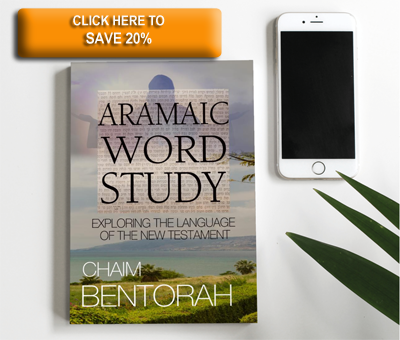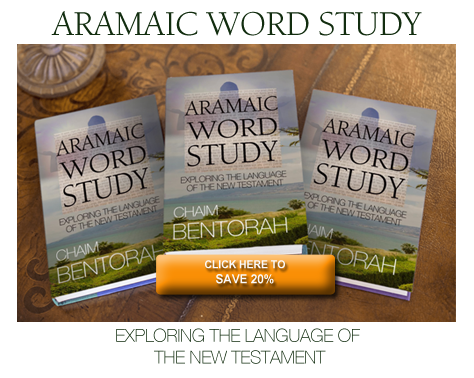Aramaic Word Study – Outer Darkness – Choshuka Bari
(This Word Study is excerpted from Chaim Bentorah’s book: Aramaic Word Study: Exploring The Language Of The New Testament)
Matthew 8:12: “But the children of the kingdom shall be cast out into outer darkness: there shall be weeping and gnashing of teeth.
I grew up in a fundamentalist church where there were many fire and brimstone sermons. Now I was raised to believe everything our preachers taught. They were put there by God and I was not to question anything they taught. But there were many things I struggled with. Later in life, I was diagnosed as having Asperger’s Syndrome. I was told that I did not think as most people thought. I thought more about pictures which is why I was drawn to the Hebrew because it is a language of pictures. So maybe that is why I struggled with some of the sermons I heard.
One thing I could not put together that the preachers easily put together was being cast into a lake of fire which was outer darkness. Now I knew about darkness. My father would love to take us camping, I hated it, because when it got dark, boy did it get dark. There were no city lights to obscure the darkness. My father would fire up an old Coleman kerosene lantern and as soon as that mantel caught fire the who area lit up. This is the picture I had of outer darkness and fire. The fire was light, darkness was no light. So what was it, were sinners cast into outer darkness or into a lake of fire which has a lot of light.
I was reading in Jewish literature that there are three types of darkness mentioned in the Old Testament. For example, you have a ‘alatah darkness. This is heavy darkness, the darkness that came when God made his covenant with Abraham in Genesis 15:17. This is often a word used for dusk or dawn. Dusk or dawn was often a meditative time. It was still too dark to begin or continue any type of labor and so it was a meditative time, a time to plan your day or meditate on what needed to be done the next day. ‘Alatah is associated with a time of meditation and reflection. You do not associate evil with this darkness.
Then there was choshke ‘aphelah, tangible darkness which is a darkness of evil and wickedness. This is the darkness of the ninth plague. It is supernatural darkness, like the darkness that fell on the earth after Jesus’s death. For those outside the protection of God as with the Egyptians, it was darkness filled with terror, fear, and likely demonic beings. I often wondered what was so horrible about the darkness of the 9th plague. I mean they had darkness at night all the time why should this be different? It was different because it was not just choshke (darkness), but choshke ‘aphaelah, a darkness filled with terror and fear that you actually felt, a darkness that was tangible.
Then you had a darkness known as ‘araphel which is a thick darkness. It is called thick because it is a rain cloud filled with water. Rain was considered a cleansing agent. It was dark because it was filled with water. This is found in Genesis 20:21, the cloud of God that Moses entered. The Bible said there was thunder and lightning coming from cloud. Lightning is an electrical discharge and an electrical discharge in the atmosphere creates ozone which you can feel and smell and creates a euphoric feeling. So this type of darkness ‘araphel is a good type of darkness and should properly be translated as a dark cloud, it is associated with cleansing and purification. It was in this darkness that the law of God was given to help man be purified.
But when we get to the New Testament in Matthew 8:12, Jesus taught the fourth type of darkness. English calls it outer darkness, the Greek calls it ho skotos ho exoteron, the Aramaic, the language Jesus spoke, is chashuke bria. This is really interesting because the word chashuke is similar to the Hebrew word choshke which means void of light, separation from light. Only the darkness of the ninth plague uses the Hebrew word choshke or darkness that is devoid of light. The other two words for darkness which have a positive spin do not use choshke. This outer darkness has no light. Choshuke means devoid of light, but not necessarily an illumination, it can also be a spiritual void without spiritual light or the Light of God. In other words, this is compatible with our fire and brimstone if you so wish as it is not speaking of a lack of luminary light but the lack of the Light of God.
It is the next word that is really interesting. The word for outer in Aramaic is bari which is the Aramaic word for creation. This darkness is a created darkness. God is continually creating something that happens naturally. Once he removes His presence or His light he creates a chashuke bria, an outer darkness, a void where He cannot be reached.
I don’t know about you but for me, the horror of hell is not fire and brimstone, it is the eternal chashuke bria, the darkness, the void that is created when God removes His presence.
(This Word Study is excerpted from Chaim Bentorah’s book: Aramaic Word Study: Exploring The Language Of The New Testament)
Thanks & Blessings, it means a lot to me!









Enjoyed this one as I do most. I particularly appreciated the explanation of the different darkness’s. It also helps affirm my understanding of death which I think is also linked to separation from God.
Thank you,
This clearly and scripturally defines hell. I will be able to explain the concept from a logical point of view.
Everything good and holy that was treated with contempt will be absent.
In the paragraph when you’re talking about the thick darkness that was like rain you put Gen. 20:21 and there is No Gen. Verse 21 you may want to correct this so the readers don’t get confused.
EXO. 20:21 would be the correct one.
How very very patient is our God…I pray all would understand what it is we are choosing and how very ignorant man is turning away from a loving Father… thank you my brother for your never ending obedience to Jesus Christ our KING! :)
That last sentence supports what I’ve come to believe “hell” will be; not “fire and brimstone” but rather the unimaginable sorrow of God’s withdrawing His presence from those who just don’t want Him in their lives. The “fires of hell” may well be the torturous experience of coming to understand just how much God loved and care for each wayward individual despite their determination to avoid a relationship with God. What a terrible feeling to know the darkness of His absence. God is a God of love; He forces nothing on us, including His love. The day will come when He withdraws His unwanted presence…
Thank you for these enlightening descriptions on darkness. Oh that we all choose to walk in the Light of God.
This is very good knowledge and understanding.
Thank you for this valuable description of differences.
So a non-believer who dies unsaved goes to hades/Gehenna to wait. Catholics call this purgatory, and believe the soul while waiting for judgment can elevate itself so it escapes the outer darkness that is absolute nothingness. If it is nothingness, the punishment is having the soul perish because nothingness gives room for a way to define itself.
Lack of meaning and presence to create even a mental reality is not a blank canvass that is painted with darkness, there is no canvass at all. That is true he’ll when even the dead soul is something that hopes to be reborn.
Believers go to Paradise, their waiting time with Christ. When the “raptura” occurs, and those who believe will be spared the horrible time up to the time of the return of Christ. The restoration of the earth will be a true delight and gift to behold. The 1000 year reign will be amazing. I am ready. But when the HaSatan is released, those on the earth unsaved will have one last chance to come into the kingdom or not. No doubt this evil being will try to convince those individuals that following him (Satan) will be better than submitting to the rule.
Like you I believed everything I was taught and felt wrong for even questioning within myself. Turns out the questioning was valid. Thank you for your studies and sharing them brother!!!
I love the way you think. I am no on the scale and I too think in pictures.